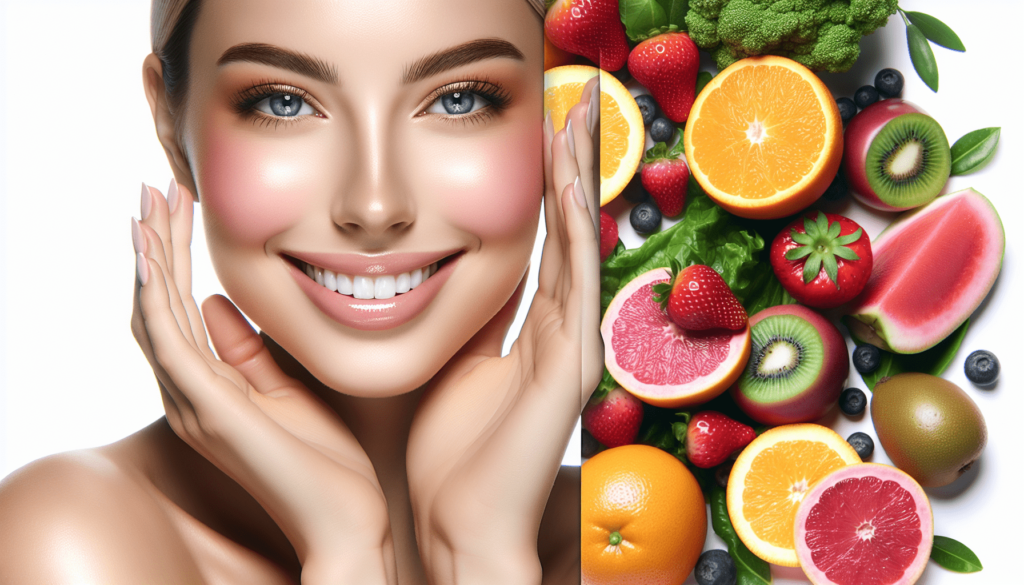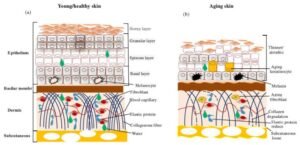
Have you ever wondered if the food you eat could impact your skin complexion? Well, according to some dermatologists, it just might. Certain foods contain essential nutrients that can promote collagen production, prevent wrinkles, and give you that youthful glow. Vitamin C-rich foods like strawberries and citrus fruits can work wonders for your skin, while sunflower seeds and almonds provide vitamin E for hydration and protection. Dark orange and red veggies, as well as leafy greens, contain beta-carotene that can give you a fresh complexion. And let’s not forget the importance of zinc, iron, and omega-3 fatty acids found in fortified cereal, lean meats, and fish. With all these possibilities, it’s time to take a closer look at the connection between our diet and our skin.
Introduction
Have you ever wondered if what you eat can impact the health and appearance of your skin? Well, recent studies suggest that there is a strong connection between diet and skin complexion. Certain foods have been found to reduce inflammation, promote collagen production, and protect the skin from harmful free radicals. In this article, we will explore the link between diet and skin health, and how you can incorporate skin-friendly foods into your daily routine. So, get ready to discover the secrets to a clear, youthful, and radiant complexion through the power of your plate!
Anti-inflammatory foods
Explaining the link between inflammation and skin issues
Inflammation is not just a bodily response to injury or infection; it can also manifest on our skin in the form of redness, acne, and other skin conditions. Many dermatologists now believe that the foods we consume can either fuel or fight this inflammation. By understanding which foods have anti-inflammatory properties, we can make conscious choices to support our skin health.
Highlighting foods that reduce inflammation and promote clear skin
Certain foods have been found to have powerful anti-inflammatory properties that can help combat skin issues. Some of these foods include fatty fish like salmon and mackerel, walnuts, and flaxseeds, which are rich in omega-3 fatty acids. Additionally, brightly colored fruits and vegetables, such as berries, leafy greens, and tomatoes, contain antioxidants that fight inflammation and promote clear skin. Incorporating these foods into your diet can make a noticeable difference in the appearance and health of your skin.
Discussing the importance of antioxidants in fighting inflammation
Antioxidants are the superheroes when it comes to fighting inflammation and protecting our skin from damage. They neutralize harmful free radicals that can cause oxidative stress and accelerate the aging process. Eating a diet rich in antioxidants can help reduce inflammation and support healthy skin. Some antioxidant-rich foods include blueberries, green tea, dark chocolate, and even red wine (in moderation). So why not indulge in these delicious treats while giving your skin a boost?
Collagen-boosting diet
Explaining the role of collagen in maintaining youthful skin
Collagen is a protein that plays a crucial role in maintaining the elasticity and firmness of our skin. As we age, the production of collagen decreases, leading to wrinkles and sagging skin. However, certain foods can help boost collagen production and keep our skin looking youthful. Vitamin C is particularly important for collagen synthesis, so make sure to include foods like strawberries, citrus fruits, red peppers, and broccoli in your diet.
Listing vitamin C-rich foods that promote collagen production
Vitamin C is not only an antioxidant but also a key player in collagen production. It helps our bodies produce collagen, which is essential for maintaining the integrity of our skin. Incorporating vitamin C-rich foods into your diet, such as citrus fruits, kiwi, and bell peppers, can stimulate collagen synthesis and help prevent the formation of wrinkles.
Mentioning foods rich in vitamin E for skin hydration and protection
Vitamin E is another powerful antioxidant that can benefit our skin health. It is known for its ability to protect the skin from free radicals and keep it hydrated. Foods like sunflower seeds, almonds, and spinach are excellent sources of vitamin E and can contribute to a healthy, glowing complexion.
Discussing the benefits of beta-carotene in regulating cell turnover
Beta-carotene is a precursor to vitamin A and is responsible for giving certain fruits and vegetables their vibrant orange and red colors. By incorporating foods rich in beta-carotene into your diet, such as carrots, sweet potatoes, and butternut squash, you can support cell turnover and achieve a fresh, glowing complexion.
Exploring the connection between zinc, iron, and healthy skin functioning
Zinc and iron are two minerals that play a significant role in maintaining healthy skin. Zinc helps regulate oil production, reduce inflammation, and promote wound healing, while iron supports the oxygenation of skin cells. Foods like lean meat, seafood, nuts, and whole grains are excellent sources of these essential minerals and can contribute to a more radiant complexion.
Avoiding skin stressors
Highlighting the negative impact of dehydration on skin health
Dehydration is not only detrimental to our overall health but also to our skin. When we are dehydrated, our skin becomes dry, dull, and more prone to wrinkles. Drinking enough water throughout the day is essential for maintaining proper hydration and achieving a plump and dewy complexion. Remember to listen to your body’s thirst cues and make water a priority in your daily routine.
Discussing the effects of omega-3 fatty acids on skin inflammation
Omega-3 fatty acids are not only beneficial for reducing inflammation but also for maintaining healthy skin. Foods like fatty fish, flaxseeds, and walnuts are rich in omega-3s and can help calm inflamed skin and reduce the appearance of wrinkles. Including these foods in your diet can support overall skin health and promote a more youthful complexion.
Mentioning the potential benefits of dark chocolate in improving skin elasticity
Who knew that indulging in a piece of dark chocolate could actually benefit your skin? Dark chocolate with a high cocoa content contains antioxidants that can potentially improve skin elasticity and protect it from UV damage. So, the next time you have a craving for something sweet, reach for a piece of dark chocolate and give your skin a treat!
Exploring the role of polyphenols in protecting the skin from free radicals
Polyphenols are another group of antioxidants that can do wonders for our skin. They help protect the skin from harmful free radicals and can be found in foods like green tea, berries, and even red wine. Including these polyphenol-rich foods in your diet can provide an added layer of protection for your skin, keeping it healthy and youthful.
Discussing the possible connection between high-glycemic foods and acne
High-glycemic foods, such as sugary treats and refined carbs, can cause a spike in insulin levels and lead to inflammation in the body. This inflammation can manifest on our skin in the form of acne. By opting for whole grain foods with a low glycemic index, like quinoa and brown rice, you can help stabilize insulin levels and potentially reduce acne breakouts.
Explaining the impact of sugar on skin aging and wrinkles
Sugar not only affects our waistlines but also our skin. When we consume excessive amounts of sugar, it can lead to the formation of advanced glycation end products (AGEs) in the skin. These AGEs can weaken the collagen and elastin fibers and make the skin more prone to wrinkles. By reducing your sugar intake and opting for healthier alternatives, you can support your skin’s elasticity and youthfulness.
Addressing the potential link between milk consumption and acne
While research on the connection between milk and acne is ongoing, some experts suggest that there may be a link, especially with skim milk. Hormones present in milk, as well as the potential impact on insulin levels, could contribute to acne development. If you notice a correlation between your milk consumption and acne breakouts, it may be worth exploring alternative dairy options or reducing your intake.
Highlighting the negative effects of spicy foods on individuals with rosacea or fair skin
Spicy foods can cause temporary flare-ups for individuals with rosacea or fair skin. The capsaicin found in spicy foods can dilate blood vessels and increase redness and flushing in these individuals. If you have rosacea or fair skin, it may be best to moderate your spicy food intake to minimize any unwanted skin reactions.
Lifestyle integration
Offering tips on incorporating skin-friendly foods into a busy schedule
We understand that maintaining a healthy diet can be challenging, especially with a busy schedule. However, there are ways to incorporate skin-friendly foods into your daily routine without adding extra stress. One simple tip is to plan your meals and snacks in advance, so you have nutritious options readily available.
Suggesting meal ideas for breakfast, lunch, dinner, and snacks
To help you get started on your clear skin journey, here are some meal ideas that are packed with skin-friendly nutrients:
- Breakfast: Start your day with a bowl of whole-grain cereal topped with nut milk and a handful of fresh strawberries. Pair it with a cup of green tea for an antioxidant boost.
- Lunch: Enjoy a grilled chicken sandwich loaded with fresh veggies, like spinach and tomatoes. Have an apple on the side for added fiber and nutrients.
- Dinner: Indulge in a delicious and nutritious dinner of wild salmon accompanied by a leafy spinach salad and a baked sweet potato.
- Snacks: For snacks, opt for a cup of yogurt with a sprinkle of sunflower seeds, an orange for a vitamin C boost, or a piece of dark chocolate or a glass of red wine (in moderation) for your polyphenol fix.
Plan and prepare meals in advance
Meal planning and preparation can not only save you time and stress but also ensure that you have nutritious meals ready to go. Consider setting aside some time each week to plan your meals, create a grocery list, and prep ingredients or even full meals in advance. This way, you can easily incorporate skin-friendly foods into your diet without feeling overwhelmed.
The importance of hydration and water intake strategies
Hydration is key to maintaining healthy skin. Besides drinking water, you can also include hydrating foods in your diet, such as watermelon, cucumbers, and leafy greens. Additionally, try incorporating strategies to help you stay hydrated throughout the day, such as carrying a reusable water bottle with you and setting reminders to drink water regularly.
The benefits of meal prepping and batch cooking
Meal prepping and batch cooking can be game-changers when it comes to sticking to a skin-friendly diet. By preparing larger quantities of meals and storing them in individual portions, you can save time and ensure that you always have healthy options on hand. Consider dedicating a day to meal prepping and batch cooking, and reap the benefits of a well-planned and nourishing diet.
Conclusion
In conclusion, the food we eat plays a crucial role in the health and appearance of our skin. By incorporating anti-inflammatory foods, collagen-boosting nutrients, and avoiding skin stressors, we can support our skin’s natural healing processes and achieve a clear and youthful complexion. Remember to start small and make gradual changes to your diet for long-lasting improvements. A balanced and varied diet, along with a healthy lifestyle, will empower you to take control of your skin and radiate confidence from within. So, why wait? Start nourishing your skin through your food choices today!










Thanks for sharing. I read many of your blog posts, cool, your blog is very good.